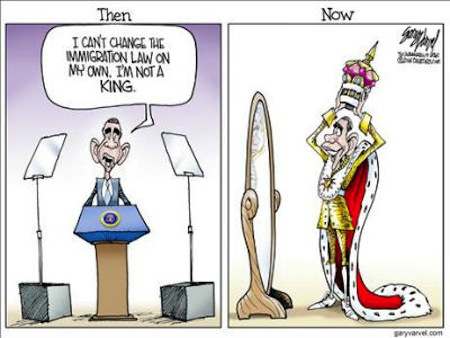

11/15/2019
The DACA case has reached the Supreme Court which shows how corrupt our legal system has become because Obama’s unlawful amnesty never should have gotten that far.
The Constitution clearly states, “The Congress shall have Power To…establish an uniform Rule of Naturalization….” (Article 1, Section 8, Clause 4), so Obama’s king-like creation of the DACA category was entirely unlawful, but he did it anyway. It was a major abuse of our founding document, causing increased illegal immigration of thousands, but there was little dissent from the Congress or the press.
President Obama himself recognized the illegality of an executive amnesty, shown by his frequent mention of the fact that his powers did not allow such an action. A video from 2014 showed several instances of his explaining that constitutional limitation:
Nevertheless, Obama went ahead and enacted his DACA amnesty despite its illegality. Hopefully we will see the odious thing dismantled soon.

The arguments were heard in the Supreme Court on Tuesday, and the legal smackdown of the Obama Amnesty must have gone pretty well, judging from the headlines.
The newspaper headline of the Washington Post read, “High court seems receptive to effort to end DACA.”
National Public Radio judged, Supreme Court May Side With Trump On ‘DREAMers’.
Here’s The New York Times article, reprinted by MSN.com:
Supreme Court Appears Ready to Let Trump End DACA Program, New York Times, November 14, 2019
WASHINGTON — The Supreme Court’s conservative majority appeared ready on Tuesday to side with the Trump administration in its efforts to shut down a program protecting about 700,000 young undocumented immigrants known as Dreamers.
The court’s liberal justices probed the administration’s justifications for ending the program, expressing skepticism about its rationales for doing so. But other justices, including President Trump’s two appointees, indicated that they would not second-guess the administration’s reasoning and, in any event, considered its explanations sufficient.
“I assume that was a very considered decision,” Justice Brett M. Kavanaugh said of a second set of justifications offered by the administration in a memorandum last year after its decision to end the program was challenged in court.
Justice Neil M. Gorsuch said he saw little point in requiring the administration to come forward with better or more elaborate reasons. “What good would another five years of litigation over the adequacy of that explanation serve?” he asked.
Still, the justices agreed that the young people who signed up for Deferred Action for Childhood Arrivals, or DACA, were sympathetic and that they and their families, schools and employers had relied on it in good faith. “I hear a lot of facts, sympathetic facts, that you’ve put out there, and they speak to all of us,” Justice Gorsuch said.
And while Chief Justice John G. Roberts Jr. indicated that the administration was on solid legal footing in saying the program was unlawful, he said the Supreme Court could rule in a humane way, minimizing the hardships people participating in the program would face if it were ended.
“It’s not always the case when the government acts illegally in a way that affects other people,” he said, “that we go back and untangle all of the consequences of that.” The program, he suggested, could be wound down in measured steps.
Chief Justice Roberts added that both the Obama and Trump administrations have said they would not deport people eligible for the program, meaning that the main practical questions if the program is ended would be their ability to work legally, obtain driver’s licenses and the like.
“The whole thing was about work authorization and these other benefits,” the chief justice said. “Both administrations have said they’re not going to deport the people.” (Continues)
What’s wrong with deporting the DACAs? It’s a free ride home.
Think of all the wonderful diversity they could experience in their own countries. Some foreigners adjust happily to their true homeland. Anyway, on a planet with seven billion persons, not everyone can relocate to America or Europe. Reforms at home are called for, now more than ever.